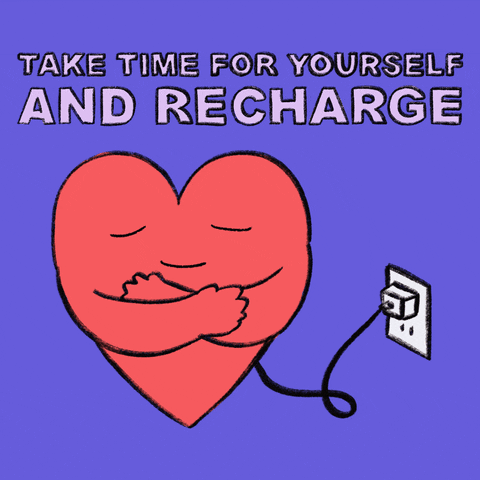Guide to Support Post-Sensuality Burnout 🥱

Animated GIF by INTO ACTION
We don’t often talk about the comedown after intimacy. This could result from a string of summer hookups, seemingly endless dating app scrolling, or pouring yourself into everyone else’s needs. You might notice the fog, the irritability, or even a crash out. This is called post-sensuality burnout and you’re not alone in feeling this way.
Burnout isn’t just connected to work. The American Psychological Association shows that chronic overstimulation can mimic the same cycles as stress burnout: emotional fatigue, physical tension, and a dulled sense for anything that previously brought you joy. When your system is at overcapacity, even the things that usually feel exciting and nourishing like sex, connection, and pleasure, can start to feel heavy.
This guide isn’t about “fixing” you or your situation. We’re just here to outline ways to slow down, tune in with more intention, and find softer paths back to yourself!
Why It Happens
Research on stress and arousal shows that our bodies need time to recover from big spikes in adrenaline, oxytocin, and dopamine. Think of “post sensuality burnout” as a kind of pleasure fatigue. You may feel:
-
overextended because your nervous system is still “on” and doesn’t know how to calm down
-
emotionally raw from experiencing big intimacy, which can dig up old wounds or amplify insecurities
-
disconnected after intensity, therefore allowing emptiness to creep in
-
unprocessed emotions if sex has been layered on top of stress, trauma, or a lack of sleep
Dr. Casey Tanner says that bodies crave balance. If you’ve been riding highs, it’s completely natural to need recovery time before your nervous system feels safe enough for pleasure again.

Look Out for These Burnout Signals
Here are a few signs that might show your body is asking for extra care:
-
trouble sleeping
-
restless dreaming
-
feeling “clingy” or wanting total isolation
-
low libido for days after intimacy
-
physical fatigue, headaches
-
emotional flatness
-
irritability
-
trouble feeling present with partners and/or yourself
-
a sense of “checking out” during intimate moments
Recovery Support
Here are evidence-backed and accessible ways to meet yourself where you’re at:
Somatic Therapy
-
Shake out your arms, legs, or spine for a few minutes to release tension.
-
Try lying on your back, with knees bent, feet on the ground, and let your breath slow naturally.
Journal Prompts
-
“When do I feel absent in my body?”
-
“What sensations signal that I need to slow down?”
-
“What does enough closeness/intimacy feel like for me right now?”
Nervous System Reset
-
Try humming, gargling, or splashing cold water on your face.
-
Inhale for 5, then exhale for 7

When You’re Ready to Reconnect
Burnout doesn’t mean you’re broken! It means your system is asking for a gentler pace. To build more resilience over time and even tiptoe back into pleasure:
-
explore non-sexual contact like back rubs, foot massages, and holding hands
-
try a new toy without high expectations
-
communicate boundaries and use phrases like “I want closeness, but let’s go slow”
-
plan short breaks during intimate moments to breathe, sip water, or reflect/reset
-
track your cycle, mood, or stress levels to notice patterns
-
build safe community circles where intimacy and recovery are normalized
Resources We Love
Here are a few supportive spaces:
READ
-
Burnout: The Secret to Unlocking the Stress Cycle by Emily & Amelia Nagoski
-
Notes on a Nervous Planet by Matt Haig
-
When the Body Says No: The Cost of Hidden Stress by Dr. Gabor Maté
LISTEN
-
Ev’Yan Whitney’s Sensual Self podcast
-
Dan Savage’s Savage Lovecast
-
Headspace podcasts
-
Therapy Jeff’s Problem Solved podcast
COMMUNITY
-
Jimanekia Eborn’s Tending the Garden (community healing for survivors)
-
Alex Elle’s Substack essays on community care
Post-sensuality burnout is real. Your nervous system needs restoration after intensity. Soothing acts, curiosity, and gentle pacing are major ways you can reconnect. This way, pleasure is much more sustainable when you give yourself time and permission to recover.




